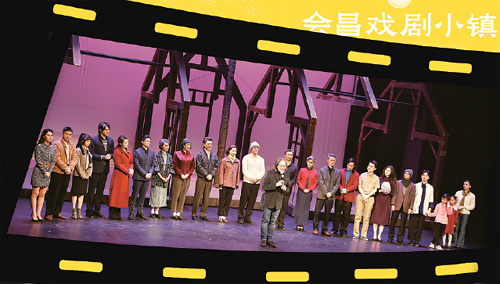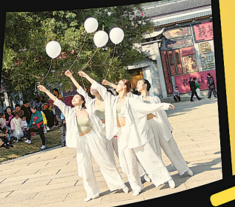

Playing a big role
The college and the theater village project benefit not only local youth but also the Chinese theater industry as a whole, according to Wu. "Top theater academies in Beijing and Shanghai train a number of artists and planners, but they still cannot meet the demand of the numerous local theaters, film crews, media companies, and organizers of ceremonial events, such as weddings and funerals, across the country. The industry lacks technical professionals, and that's where we come in," he said.
"Some of our future graduates may choose to stay in Huichang, as the theater village provides regular jobs. Others may move to other places, becoming a driving force in China's theater industry. Some may even become artists themselves," Wu added, highlighting that the theater village serves as an "incubation center" for both creators and practitioners.
Apart from the theater college, Lai has also established a branch of his Theater Above in the village, providing theater education to enthusiasts of all ages. "We have many follow-up plans, including those related to personal creation," he said. "I hope we can invite artists from around the world to reside in the village."
The local government presents the village as a theater-themed town centered around four aspects of theater activities: watching, learning, acting, and creating.
In addition to providing training for theater students, the program also offers a platform for young talents to stage their productions. The Huichang Theater Season this month includes 20 street performances by acting troupes from China and overseas, most of which feature young actors or theater college students.
Xu Xu, a 20-year-old performing arts major at Southwest Minzu University in Sichuan province, is one of these young performers.
With six classmates, Xu brought to the village a Sichuan dialect adaptation of Longxugou, a play by Beijing writer Lao She (1899-1966). From Jan 7 to 15, they will perform twice daily at various locations, including the ancient city gate, a square, and the riverside. Integrating modern environmental theater elements into this 1950s classic, they aimed to present a new version of Longxugou relevant to today's audience.
"This is our first time bringing our production to such a significant theater event, and I feel honored to perform for audiences from both home and abroad in this enchanting theater village," Xu said. "As students, we rarely perform outside of school, usually limited to our university's studio theater. So we are very grateful for this opportunity, as it is hard-won."
Xu recalled how they adjusted their scripts and acting before submitting their work for selection in December.
"We were afraid that we wouldn't qualify. Being confined to the school environment, our creativity and ideas are relatively limited compared to the more playful, personalized, and edgy productions off-campus," she explained. "Now that we are here, we see it as a chance to broaden our horizons, learn from others, and improve ourselves."
She said she is looking forward to watching other street performances by young creators in Huichang Theater Village. These shows include performances featuring clowns, puppets, magic and improvisation.
According to Lai, the Huichang Theater Village is distinct from conventional theater festivals, like the annual theater festival in the ancient water town of Wuzhen, Zhejiang province. As a year-round initiative, the village will host shows, theater training programs, spaces for theater creation, performance rehearsals, and cultural exchanges all year round, ensuring an ongoing theater buzz and presence.

The Village was one of the three works that Lai presented during the theater season in Huichang. It narrates bittersweet stories of military families moving from the Chinese mainland to Taiwan in the last century. The second work, adapted from a 1986 work by Lai himself, Secret Love in Peach Blossom Land, The Tea House Opera Version, embodies Jiangxi tea-picking opera, a national intangible cultural heritage. And the third one, Flower in the Mirror, Moon in the Water, is a specially designed production for the village, staged in the town's garden theater, which was transformed from an ancestral temple.
As Lai emphasized, the theater village aims to build a cultural and creative ecosystem rather than just hosting one-off events or serving solely as a tourist spot. Theater, with its rich art and culture, is reshaping this county for the better.
"Though no one can guarantee what lies ahead, at least we have a vision for it," Lai said.